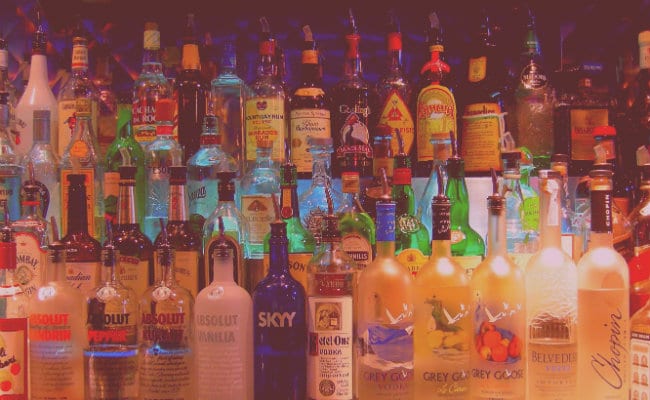Alcohol is one of the most popular legal drugs, addictive and that produce greater negative effects in individuals who abuse the substance and in other areas such as social or work. This substance has been consumed since time immemorial and over the years, it has had different uses.
In today's society, more than being an aid to socialize and enjoy certain places or situations, its abuse has become one of the biggest problems of our time. However, it is a topic that we already dealt with previously in this post about alcoholism; So in this article we will only limit ourselves to talking about the substance, its origin or history, the effects it produces, the consequences of its abuse and irresponsible use, among others.
We explain what alcohol is and where it originates from

It is known under that name, due to its meaning in Arabic (distilled liquid); which refers to certain organic chemical compounds that instead of having a hydrogen and alkane atom, have a hydroxyl group, in addition to being linked to a carbon atom.
There are different types of alcohols with different uses, but in this post we will deal specifically with ethanol (ethyl alcohol), which is the one used in alcoholic beverages. This is considered a legal drug in practically all the countries of the globe and as we mentioned previously, a real headache that produces millions of deaths annually due to dependence and external factors (such as car accidents) that are the product of its consumption.
What are alcoholic beverages and what are their types?
Obviously they are beverages whose compositions include alcohol in a natural way or has been added, with the purpose of being marketed for the enjoyment of the population (except for those who abuse it). The types are:
- Fermented drinks, among which we find wine, cider and beer. Its production process is through the fermentation of cereals or fruits.
- Distilled beverages for their part are whiskey, rum, vodka, gin or cognac, which use the distillation process in fermented ones to eliminate water; that way to get more of the substance.
Functioning in the body
When ingested, it cannot be processed quickly by the liver, which results in its passage into the blood; means of transport that allows the arrival of the substance to the brain, which is where the effects that we will see later take place.

What are the effects of alcohol?
The effects can be varied depending on the dose consumed and the frequency with which it is drunk (due to the ability of the substance to generate tolerance quickly). In addition, they may also vary depending on the age, mood, weight, type of drink ingested, and even sex. However, leaving these factors aside, we can mention the general effects that this substance produces:
- In moderate doses, it increases sexual desire, which is why some alcoholic beverages are considered aphrodisiacs.
- Coordination and balance can be affected when the dose consumed is higher, although as it depends on each person, this "cap" will be personal for each one.
- Reduction of external stimuli.
- Communication is affected, since the ability to speak and express oneself with other people normally is impaired.
- Decreased ability to concentrate and control.
- Slow reflexes.
- Difficulty in sight and hearing.
- Nausea and vomiting due to irritation caused in the stomach.
According to a study carried out on a certain number of people, it is possible to know an approximate of how many grams of alcohol (per liter in the blood) are necessary to alter the mental state and present different effects depending on it. Here we present this comparative table:
| Grams | Featured Effects | Behavior | STATUS |
| 0,5 | Slowness | Common and ordinary | Happiness or joy |
| 0,5 to 1 | Clumsiness and blurred vision | Uninhibited | Euphoria |
| 1 to 1,5 | Difficulty communicating and double vision | Loss of self-control | Emotionally unstable |
| 1,5 | Speech and ability to walk are affected | Total lack of control | Incoherent |
| 2 to 3 | The above tasks are really difficult to perform | Apathy and inability to control sphincters | No reasoning |
| 3 to 4 | - | - | Unconsciousness |
Consequences of excessive and frequent consumption

With respect to negative effects of alcohol generated in the body, we can find different conditions depending on the place of the body:
- It affects the nervous system and the brain in general, which produces effects such as mood swings, disturbance of the thinking process and difficulties in speech, balance and reaction capacity.
- In the circulatory system, for example, the substance increases cardiac activity and blood pressure (in case of consuming higher doses), increased temperature and weakness in the muscles that interact in the system.
- The digestive system can also be affected, since it collaborates in the production of acid that damages the walls of the stomach if it is consumed continuously; Likewise, alterations in the liver and kidney can also occur, contribute kilocalories to the body, among others.
- Blood is affected in the production of blood cells and promotes anemia due to it; which in turn also affects the immune and reproductive systems.
On the other hand, there are also consequences of the substance divided according to different areas, such as social, personal, health or work. Although, like the previous ones, these usually appear when there is a dependence on the substance, that is, the individual is addicted to it.
- In the Laboral scene, alcohol promotes delays, lack of responsibility, noncompliance with tasks, lower productivity and decreased cognitive performance.
- In the health, judgment can be affected, they are more prone to aging rapidly, the immune system does not work properly, weight gain, cholesterol and triglycerides, decreased testosterone in men, among many more conditions.
- In the social, the individual who manages to develop a high-level dependence, gets to withdraw from family and friends to be able to ingest the substance alone; which is distancing him from all the people around him (who want to help, but the addict rejects them).
As a curious fact, according to various investigations, the Alcohol abuse long-term It is capable of reducing life span of approximately twenty years in affected people, who usually die from some complication related to excessive intake of the substance